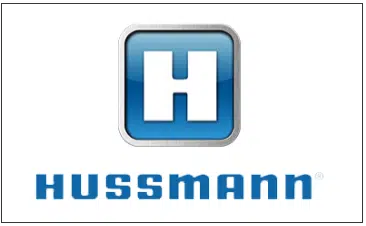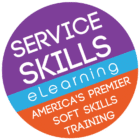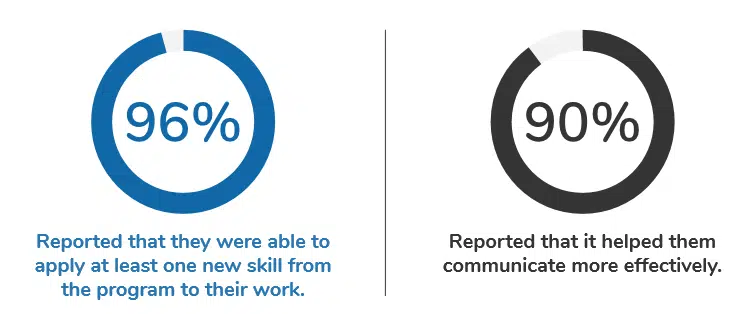Hussmann Corporation, a leading global manufacturer of refrigeration systems for food retailers all over the world, has been a ServiceSkills client for the past several years. Headquartered in Bridgeton, Missouri, Hussmann’s customers count on them to provide equipment and services that are imperative to the success of their businesses.

The company is a one-stop shop for nearly everything a supermarket, convenience store, drugstore or discount mart would need to house large quantities of food for sale: high-quality cooling systems, display cases, LED lighting, glass doors, lids and more, plus installation and maintenance. With several plants and over 30 offices around the world, from the U.S. to New Zealand and China, exceptional customer service is imperative.
Paul Nedeau, the company’s Senior Learning and Development Program Manager, has been with Hussmann for nearly six years. The company was bought out by Panasonic roughly halfway through his tenure, adding another layer to his daily responsibilities.
“My role is primarily in the learning and development realm, but I also do leadership training and work with our team managers. It’s really varied. On any given day you may find me facilitating a training session at one of our plants, putting together technical training plans, preparing a product team, and more,” he says.
The ServiceSkills Impact
Hussmann had done some smaller customer service initiatives in the past, but Nedeau identified a specific need for a comprehensive solution to unite their globally diverse customer service teams. After having implemented ServiceSkills customer service training into their employees’ workflow for one year, the company’s leadership conducted a comprehensive ROI review to assess the effect it had on their business. The numbers indicated a significant positive impact.
“I’m enthused about ServiceSkiIIs for a number of reasons, and we have quantifiable data to back that up. Metrics tell you the real story,” says Nedeau.
The courses they listed as most helpful were: Listening Skills, Five Forbidden Phrases of Customer Service, How to Handle Irate Customers and 7 Keys to a Positive Mental Attitude.
Team leaders and managers indicated a correlation between the improvement in customer service and customer satisfaction, employee satisfaction, increased productivity and sales over time through positive customer interactions.
“Our focus on developing strong internal and external customer service at our call centers has really paid off,” says Nedeau. “When clients call in asking about certain products, needing maintenance, or inquiring about any other issues that may come up, our employees are well prepared to handle everything they need in a kind and respectful way. Our customers are incredibly important to us, and that’s how they’re treated.”
The Curriculum + Working With ServiceSkills
Nedeau had previewed programs from a few other companies, eventually deciding by committee to move forward with ServiceSkills. The company particularly responded to the amount of informative content packed into each streaming module, the ability to easily dialogue with company LMS systems and the convenience of being able to stream anywhere with a WiFi connection. A ServiceSkills team member helped Nedeau determine the best curriculum to assign each of his customer service teams, then came onsite to help roll it out.
“I liked that ServiceSkills was doing something really different in the customer service training space, with the short classes, digestible modules, and great customer service they modeled.”
Nedeau himself has also taken many of the ServiceSkills courses—one of his favorites is the ServiceSimsTM Challenge Series, an interactive course that teaches employees how to deal with twelve types of difficult customers who often contact call centers. Scenarios range from overly emotional or talkative callers to those who are irate, irrational or threatening.
“Each one is only 10 minutes long, so it doesn’t require employees to make a huge time commitment. They’re already busy enough,” says Nedeau. “We had about 200 people taking those courses, and they gave us great feedback about how helpful they were. When I began taking them myself, I had to agree.”
Another feature of the training that sets ServiceSkills apart, Nedeau notes, is that many of the modules aren’t straight lectures. Instead, they often challenge employees to make split-second decisions about how to handle each customer scenario, just like a real call. Once introduced to a training scenario in the module, employees choose how to handle it from a number of options, which takes them down a specific path that may or may not bring about the desired result: a happy customer.
In the end, they’re given a rationale as to why the option they chose would or wouldn’t have been the best way to handle the situation. When presented to employees in this manner, the knowledge stays with them. Customer service employees have seen and heard it all, and it’s not always easy to adequately replicate the experience of having to de-escalate an angry or emotional customer for training purposes. But Nedeau’s employees consistently affirmed to him how closely the modules hit home.
“Our customer service teams can relate to the simulated scenarios. I’ve consistently heard them say, ‘This is so spot-on!’ or ‘Nearly all of these scenarios have happened to me and I wasn’t sure what to do,” he says.
Further, the improvements haven’t been limited to customer-facing interactions.
“Our employees also have strongly appreciated the inter-office skills training discussions, and they’re starting to learn that they don’t have to be everyone’s friend. You don’t need everyone to like you, and you also don’t need to like everyone. What’s most important is mutual respect. That’s been a very freeing lesson for them.”
“I would absolutely recommend the program to a fellow business owner.”




